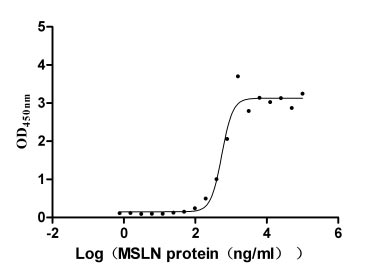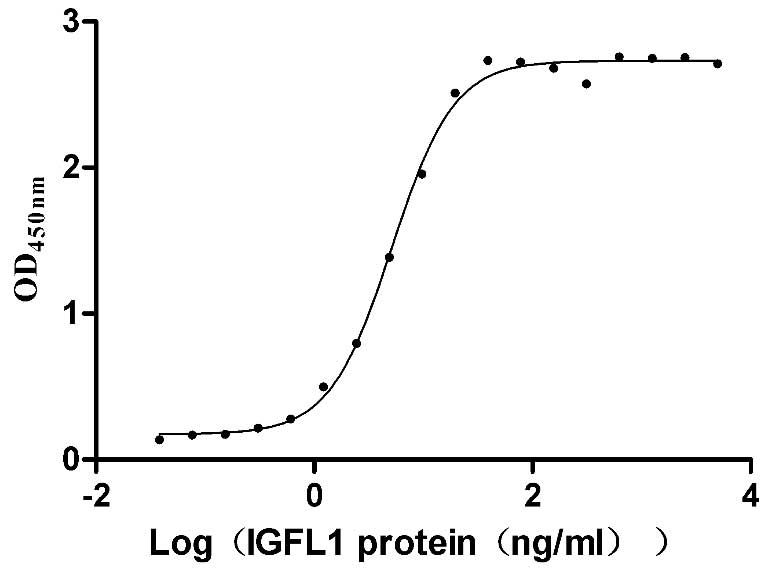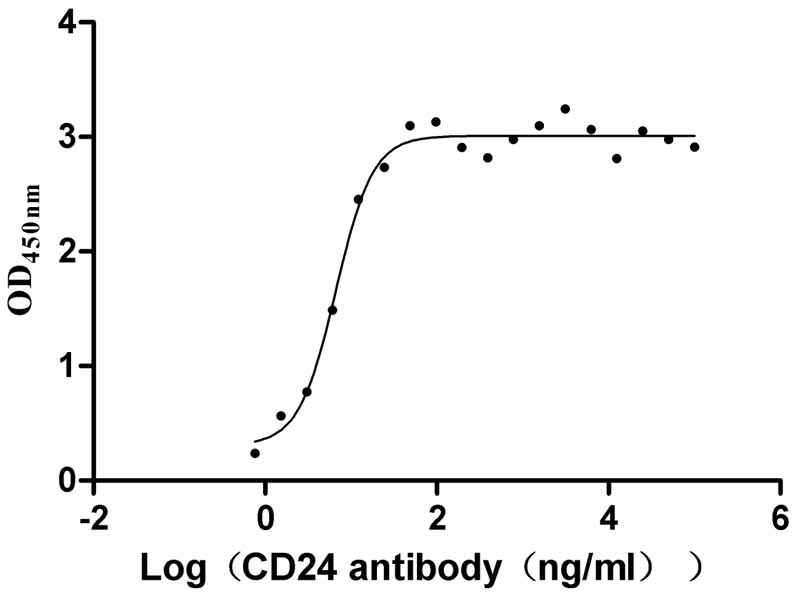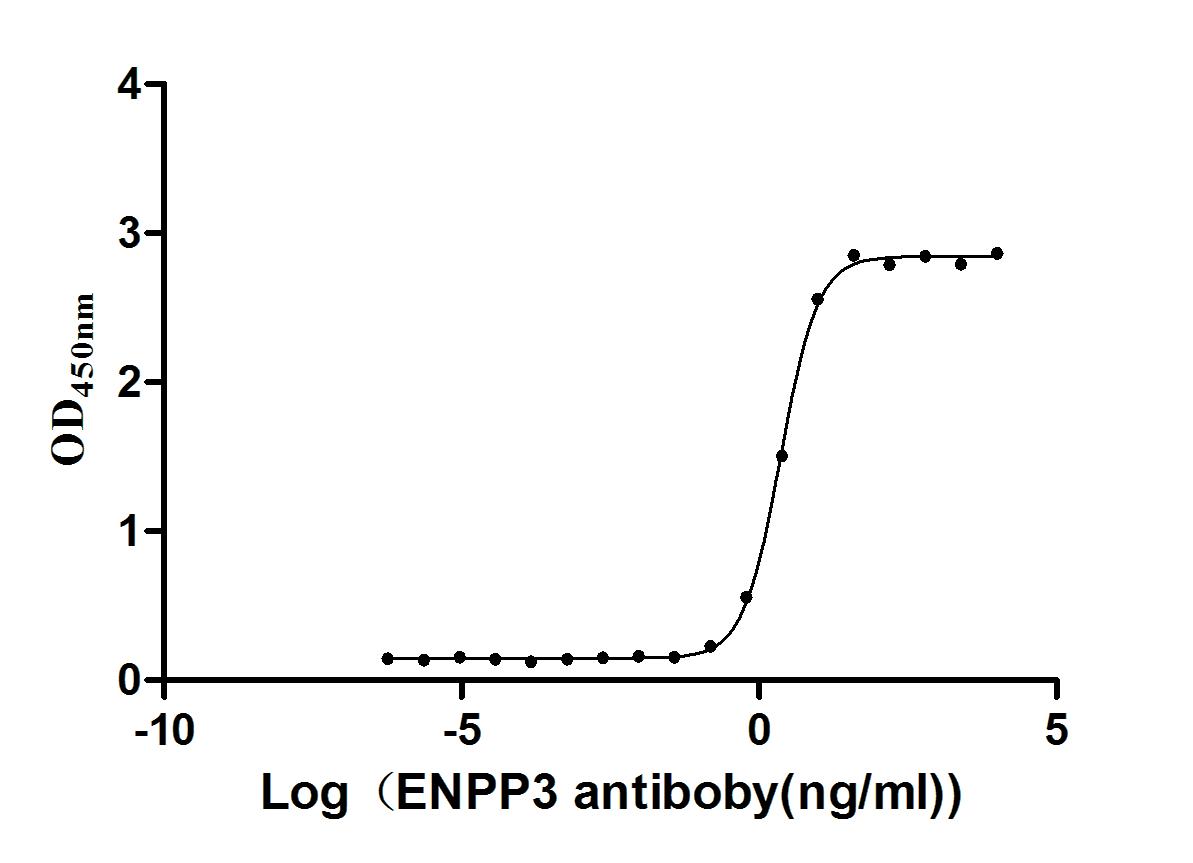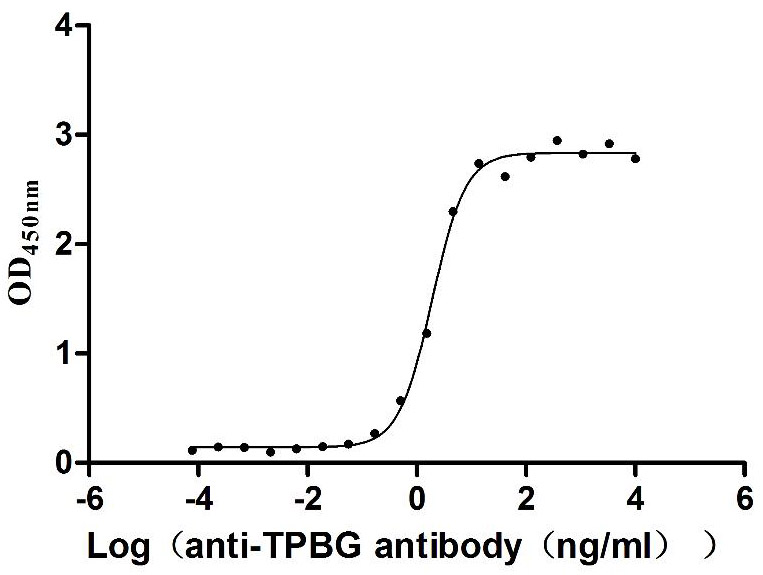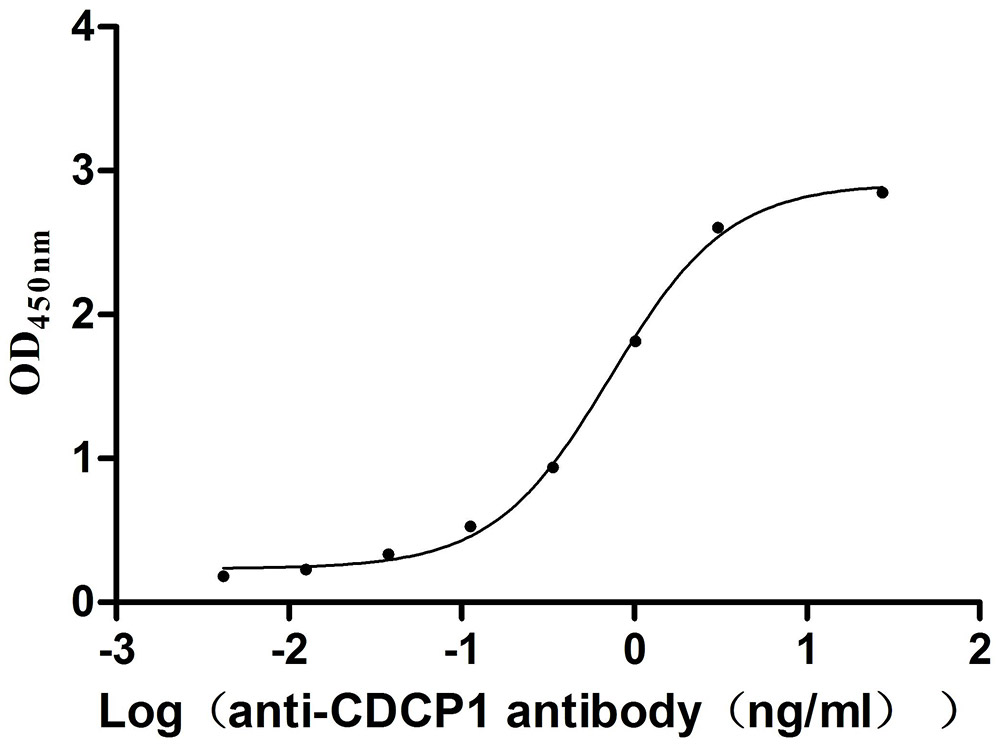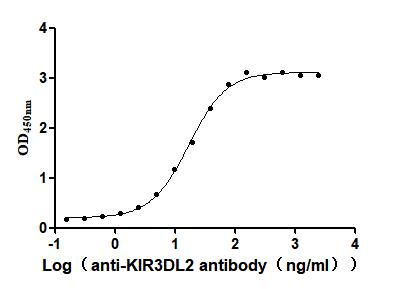Recombinant Human Monocarboxylate transporter 2 (SLC16A7), partial
-
货号:CSB-YP021414HU
-
规格:
-
来源:Yeast
-
其他:
-
货号:CSB-EP021414HU
-
规格:
-
来源:E.coli
-
其他:
-
货号:CSB-EP021414HU-B
-
规格:
-
来源:E.coli
-
共轭:Avi-tag Biotinylated
E. coli biotin ligase (BirA) is highly specific in covalently attaching biotin to the 15 amino acid AviTag peptide. This recombinant protein was biotinylated in vivo by AviTag-BirA technology, which method is BriA catalyzes amide linkage between the biotin and the specific lysine of the AviTag.
-
其他:
-
货号:CSB-BP021414HU
-
规格:
-
来源:Baculovirus
-
其他:
-
货号:CSB-MP021414HU
-
规格:
-
来源:Mammalian cell
-
其他:
产品详情
-
纯度:>85% (SDS-PAGE)
-
基因名:SLC16A7
-
Uniprot No.:
-
别名:MCT 2; MCT; Monocarboxylate transporter 2; MonocarboxylateTransporter 2; MOT2; MOT2_HUMAN; SLC16A7; Solute carrier family 16 (monocarboxylate transporter), member 7; Solute carrier family 16 member 7; Solute carrier Family 16 Monocarboxylic Acid Transporters Member 7; Solute carrier family 16, member 7 (monocarboxylic acid transporter 2)
-
种属:Homo sapiens (Human)
-
蛋白长度:Partial
-
蛋白标签:Tag type will be determined during the manufacturing process.
The tag type will be determined during production process. If you have specified tag type, please tell us and we will develop the specified tag preferentially. -
产品提供形式:Lyophilized powder
Note: We will preferentially ship the format that we have in stock, however, if you have any special requirement for the format, please remark your requirement when placing the order, we will prepare according to your demand. -
复溶:We recommend that this vial be briefly centrifuged prior to opening to bring the contents to the bottom. Please reconstitute protein in deionized sterile water to a concentration of 0.1-1.0 mg/mL.We recommend to add 5-50% of glycerol (final concentration) and aliquot for long-term storage at -20℃/-80℃. Our default final concentration of glycerol is 50%. Customers could use it as reference.
-
储存条件:Store at -20°C/-80°C upon receipt, aliquoting is necessary for mutiple use. Avoid repeated freeze-thaw cycles.
-
保质期:The shelf life is related to many factors, storage state, buffer ingredients, storage temperature and the stability of the protein itself.
Generally, the shelf life of liquid form is 6 months at -20°C/-80°C. The shelf life of lyophilized form is 12 months at -20°C/-80°C. -
货期:Delivery time may differ from different purchasing way or location, please kindly consult your local distributors for specific delivery time.Note: All of our proteins are default shipped with normal blue ice packs, if you request to ship with dry ice, please communicate with us in advance and extra fees will be charged.
-
注意事项:Repeated freezing and thawing is not recommended. Store working aliquots at 4°C for up to one week.
-
Datasheet :Please contact us to get it.
相关产品
靶点详情
-
功能:Proton-coupled monocarboxylate transporter. Catalyzes the rapid transport across the plasma membrane of many monocarboxylates such as lactate, pyruvate, branched-chain oxo acids derived from leucine, valine and isoleucine, and the ketone bodies acetoacetate, beta-hydroxybutyrate and acetate. Functions as high-affinity pyruvate transporter.
-
基因功能参考文献:
- Adipocytes promote malignant growth of breast tumors with MCT2 expression via beta-hydroxybutyrate. PMID: 28281525
- SLC16A7 (MCT2) epigenetic regulation results in protein over-expression, affecting signalling and cellular phenotypes in prostate cancer PMID: 26035357
- Data suggest that monocarboxylate transporter 2 (MCT2) at peroxisomes is related to an increase in beta-oxidation levels which may be crucial for malignant transformation. PMID: 25639644
- This study identified that CGPs was found to significantly correlate with the differential expression and methylation of genes encoding solute carrier family 16, member 7. PMID: 25243493
- Our findings suggest that SNPs in MCT1 and MCT2 genes may affect clinical outcomes and can be used to predict the response to adjuvant chemotherapy in NSCLC patients who received surgical treatment once validated in future study. PMID: 25578492
- SNPs in MCT1 and MCT2 genes may affect clinical outcomes and can be used to predict the response to adjuvant chemotherapy in CRC patients who received surgical treatment. PMID: 25492048
- MCT2-3' UTR SNP (+2626 G > A) had a strong association with oligoasthenoteratozoospermia. PMID: 24799634
- this study provided evidence for the presence of MCT2 in prostate cancer, selectively labeling malignant glands. PMID: 23192371
- The monocarboxylate transporter 2 (MCT2) protein was tumor-selectively expressed in human colorectal malignancies and knockdown of MCT2 induces mitochondrial dysfunction, cell-cycle arrest, and senescence. PMID: 22964484
- Light microscopic immunohistochemistry revealed significantly less perivascular MCT2 immunoreactivity in the hippocampal formation in medial temporal lobe epilepsy than in non-MTLE patients PMID: 22535546
- data suggest that extracellular membrane-bound CAIV, but not cytosolic CAII, augments transport activity of MCT2 in a non-catalytic manner, possibly by facilitating a proton pathway other than His-88 PMID: 21680735
- Ocular absorption of monocarboxylic acid drugs may be enhanced by MCT transporter SLC16A7, and the absorption route provided by this transporter may be utilized to improve the bioavailability of topically applied ophthalmic drugs. PMID: 20035863
- MCT2 immunoreactivity was noted in astrocytic cell bodies from week 19 and spread subsequently to the astrocyte end-feet in contact with blood vessels of visual cortex. PMID: 14757520
- Colorectal neoplasms showed a loss of expression of MCT2 in plasma membranes. PMID: 18188595
- These data demonstrate neuronal MCT2 expression in human, but since a portion of it exhibits a distinct synaptic localization, it further supports a putative role for MCT2 in adjustment of energy supply to levels of activity. PMID: 18598673
显示更多
收起更多
-
亚细胞定位:Cell membrane; Multi-pass membrane protein.
-
蛋白家族:Major facilitator superfamily, Monocarboxylate porter (TC 2.A.1.13) family
-
组织特异性:Detected in heart and in blood lymphocytes and monocytes (at protein level). High expression in testis, moderate to low in spleen, heart, kidney, pancreas, skeletal muscle, brain and Leukocyte. Restricted expression in normal tissues, but widely expressed
-
数据库链接:
HGNC: 10928
OMIM: 603654
KEGG: hsa:9194
STRING: 9606.ENSP00000261187
UniGene: Hs.439643
Most popular with customers
-
Recombinant Human Mucin-16 (MUC16), partial (Active)
Express system: Mammalian cell
Species: Homo sapiens (Human)
-
Recombinant Human Leukemia inhibitory factor (LIF) (Active)
Express system: Mammalian cell
Species: Homo sapiens (Human)
-
Recombinant Human IGF-like family receptor 1 (IGFLR1), partial (Active)
Express system: Mammalian cell
Species: Homo sapiens (Human)
-
Recombinant Human Signal transducer CD24 (CD24)-Nanoparticle (Active)
Express system: Mammalian cell
Species: Homo sapiens (Human)
-
Express system: Mammalian cell
Species: Homo sapiens (Human)
-
Recombinant Macaca fascicularis Trophoblast glycoprotein (TPBG), partial (Active)
Express system: Mammalian cell
Species: Macaca fascicularis (Crab-eating macaque) (Cynomolgus monkey)
-
Recombinant Mouse CUB domain-containing protein 1 (Cdcp1), partial (Active)
Express system: Mammalian cell
Species: Mus musculus (Mouse)
-
Recombinant Human Killer cell immunoglobulin-like receptor 3DL2 (KIR3DL2), partial (Active)
Express system: Mammalian cell
Species: Homo sapiens (Human)


